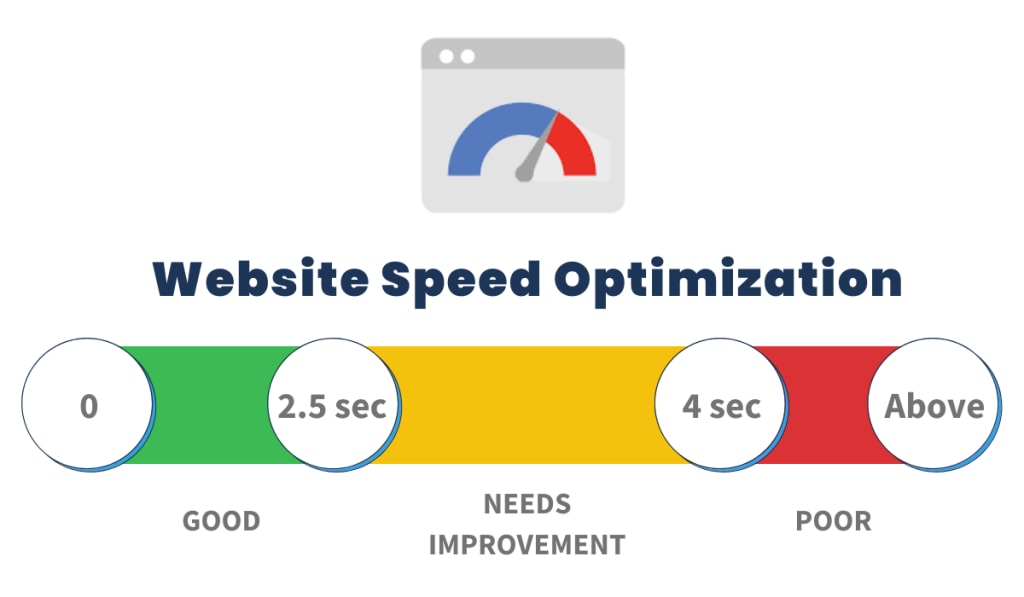The Crucial Role of Website Speed Optimization in Business Success
The importance of Websites Speed Optimization and improve client experience.

Your website’s speed is critical in shaping the first impression about your business. In today’s fast-paced digital world, a slow website can be highly frustrating for users and will likely drive them away, causing a negative impact on your business. High-performance websites, on the other hand, lead to high return visits, lower bounce rates, higher conversions, better engagement, higher rankings in organic search, and an overall improved user experience. Conversely, slow websites can cost you money and damage your reputation.
Why Website Speed Optimization Matters
Page Load Time
Page load time is a key web performance metric indicating how long it takes for a page to appear on a user's screen. Here's how website speed optimization influences key success factors:
Conversion Rates
Conversion rates measure the success of getting visitors to perform desired actions such as purchasing a product, subscribing to newsletters, registering for a webinar, or downloading a guide. Faster page loads lead to higher conversion rates. According to HubSpot, a one-second delay can result in a 7% reduction in conversions. For instance, a one-second slowdown could cost Amazon $1.6 billion in sales annually.
Visibility
Website speed affects how easily users can find your site. Google considers site speed as a ranking factor. A slow, poorly performing website offers a subpar user experience, resulting in lower search engine rankings. Since December 2017, Google has been ranking websites based on their mobile versions, even for desktop searches, to protect users from slow, non-responsive sites.
Usability
Usability, including page speed, load time, and responsiveness, directly impacts customer loyalty. A well-performing website enhances user satisfaction, contributing to a larger customer base and a stronger brand.
Assessing Your Website Speed
Improving website speed begins with a strategic assessment of your current loading times and identifying factors that slow your site. Setting precise performance goals is crucial, with a recommended page load time of under three seconds. Google’s research shows that most websites do not meet this benchmark, highlighting the importance of optimization for better user experience and competitive advantage.
Performance Evaluation Tools:
Google PageSpeed Insights: A free tool offering performance analysis and recommendations for both desktop and mobile versions.
Pingdom: A tool that tracks website performance history, provides data-driven improvement recommendations, and generates detailed reports. It offers both free and paid plans.
YSlow: Provides performance improvement suggestions, statistical analysis, and component summaries.
Performance Budget Calculator: Helps determine the optimal content type to keep your site running smoothly.
Tips for Speeding Up Your Website:
Switch to Better Hosting
Choosing fast, reliable hosting is crucial. Avoid cheap shared hosting that crams many websites onto a single server, as this can significantly degrade performance. Consider dedicated or VPS hosting for better optimization.
Reduce Extra Plugins
Identify and remove unnecessary plugins, as they can slow down your website. Only keep essential plugins and ensure they are up to date. Excessive plugins increase the resources required, negatively impacting speed.
Use Site Caching
Caching stores the current version of your website, presenting it to users until updates occur, reducing the need for repeated rendering. For WordPress, plugins like W3 Total Cache or W3 Super Cache can help. On VPS or dedicated servers, caching settings can be adjusted directly.
Minimize Redirects
Redirects create additional HTTP requests, which slow down your site. Use tools like Screaming Frog to identify and minimize unnecessary redirects.
Use a CDN (Content Delivery Network)
A CDN distributes your content across various geographical servers, reducing load times by directing user requests to the nearest server. While expensive, CDNs significantly improve performance.
Detect 404 Errors
404 errors indicate missing pages and negatively impact user experience. Use error detection tools and plugins to identify and fix these errors, ensuring all links are functional.
Implement Gzip Compression
Gzip compression reduces file sizes, minimizing HTTP requests and server response times. Enable Gzip on your site to improve loading speeds by compressing files before sending them to the browser, where they are then unzipped and displayed.
Focus on Critical Content
Ensure that critical content loads quickly, as this is what users prioritize. Combining hands-on optimization with caching and CDNs yields the best results.
Conclusion
Optimizing website speed is essential for enhancing user experience, boosting conversion rates, and improving search engine rankings. By assessing current performance, implementing strategic optimizations, and leveraging tools and technologies, businesses can unlock their website’s potential, ensuring fast, reliable, and satisfying user interactions.
About the Creator
Enjoyed the story? Support the Creator.
Subscribe for free to receive all their stories in your feed. You could also pledge your support or give them a one-off tip, letting them know you appreciate their work.





Comments
There are no comments for this story
Be the first to respond and start the conversation.